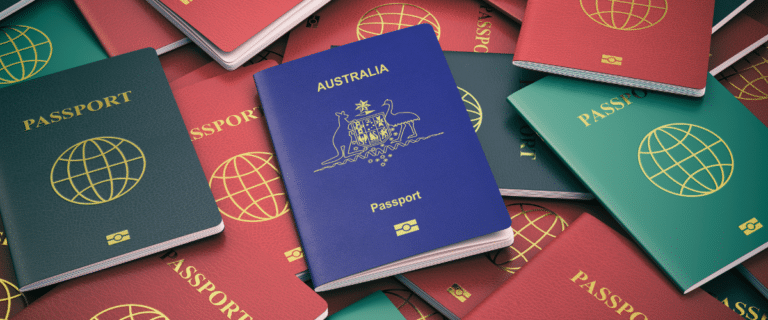On This Page...
Toggle
Visa Refusal Australia: What It Means, Why It Happens, and How to Appeal
By Nilesh Nandan — Australian Immigration Lawyer, MyVisa® Immigration Lawyers
This blog is intended for discussion purposes only and does not constitute advice. You should seek independent legal advice before relying on any information provided on this site.
Immigration policies, systems, and processes can change without notice. I’d like to know your own experience with the immigration challenges noted above — feel free to contact me.
Table of Contents
Introduction
As an immigration lawyer, I meet people every week who have experienced the shock and frustration of a visa refusal. It can feel personal — as though Australia has shut its doors on your plans. But a visa refusal doesn’t have to be the end of your journey.
A refusal simply means the Department of Home Affairs wasn’t satisfied you met one or more legal criteria at the time you applied. It does not always mean you’re ineligible to enter or stay in Australia. Many refusals can be successfully overturned through appeal, review, or reapplication.
In this detailed guide, I’ll explain what a visa refusal means, the most common reasons it happens, what your rights are, and how to take practical and lawful steps to fix your situation. Whether you’re a student, partner, worker, or tourist — understanding why a refusal occurs is the first step toward getting your application back on track.
Common Reasons for Visa Refusal in Australia
Visa refusals occur for a variety of reasons. Understanding the reason for your refusal helps you decide your next move — whether to appeal, reapply, or seek Ministerial Intervention.
- Failure to meet Genuine Temporary Entrant (GTE) criteria: Common in student and visitor visas. The Department may believe you intend to stay permanently.
- Insufficient financial evidence: Lack of clear proof you can support yourself while in Australia.
- Inconsistent or false information: Even minor discrepancies can trigger Public Interest Criterion 4020 refusals for “false or misleading information.”
- Character issues: Failing the Character Test under Section 501 of the Migration Act.
- Health concerns: Not meeting Australia’s health requirements or not completing a medical exam on time.
- Previous visa history: Overstays, visa cancellations, or poor immigration record in any country.
- Missing documents or incomplete forms: Small omissions can result in outright refusal.
Every refusal letter includes specific reasons under the Migration Regulations 1994. These details are crucial — they guide how we build your appeal or new application.
The Legal Framework: How Refusals Are Decided
The Department of Home Affairs assesses visa applications under the Migration Act 1958 and the Migration Regulations 1994. Decision-makers use a “balance of probabilities” test, meaning they decide based on whether your claims are more likely true than not.
If the case officer believes your evidence doesn’t meet legal criteria — even if you think it’s reasonable — they must refuse your application. For example, if your financial documents don’t clearly show regular income, they may conclude you can’t support yourself in Australia.
In most cases, the decision letter will also state your review rights, if any. Onshore refusals of certain visa types (student, partner, visitor, skilled, etc.) generally have merits review rights through the Administrative Appeals Tribunal (AAT). Offshore applicants usually do not have appeal rights.
Refusal vs. Cancellation vs. Withdrawal
People often confuse these three terms. Here’s how they differ:
| Action | Meaning | When It Happens | Your Rights |
|---|---|---|---|
| Visa Refusal | Your visa application was not approved because it didn’t meet the criteria. | Before a visa is granted. | May be appealed to the AAT if applied in Australia. |
| Visa Cancellation | Your visa was granted but later cancelled due to breach of conditions or character concerns. | After visa grant. | May be appealed or reviewed; legal representation strongly recommended. |
| Visa Withdrawal | You voluntarily withdraw your visa application before a decision is made. | Before decision. | No appeal rights; may reapply depending on status. |
Step-by-Step Guide: How to Appeal a Visa Refusal
If your visa was refused while you were in Australia, you might be eligible to appeal the decision to the AAT. Timing and precision are critical. You usually have 21 days from the date of refusal to lodge your appeal.
1. Read the refusal letter carefully
It tells you why your visa was refused and whether you have appeal rights. The legal reasons — known as “decision record” — are your roadmap to building a stronger case.
2. Check your appeal eligibility
Not every refusal can be appealed. Student, partner, skilled, and some visitor visa refusals usually can; others cannot. If in doubt, seek advice immediately — even one missed deadline can end your chance to stay lawfully in Australia.
3. Lodge your appeal with the AAT
You must apply online and pay the application fee (currently AUD 3,374, with 50% refundable if successful). You’ll then receive a confirmation and hearing date.
4. Prepare supporting evidence
This is where most appeals succeed or fail. You’ll need to address the Department’s reasons point by point — with new or better evidence. For example, if refused for financial insufficiency, provide six months of consistent bank records or employer letters.
5. Attend the hearing
You’ll meet an independent Tribunal Member who will assess your evidence. Legal representation can make a significant difference — ensuring your submissions align with the Migration Regulations and that your oral evidence supports your claims.
6. Await the decision
The AAT can affirm, set aside, or remit your case. A “remit” means your case is sent back to the Department for reconsideration — often leading to visa grant.
7. If refused again — consider further options
You may seek Ministerial Intervention, judicial review, or a fresh visa application under different grounds.
Post-Refusal Options Summary
- Appeal to the AAT: 21 days deadline, review rights vary.
- Reapply: Possible if visa conditions allow.
- Ministerial Intervention: Last resort for compelling or compassionate circumstances.
- Bridging Visa: Required to stay lawful while awaiting appeal.
Checklist: What to Do Immediately After a Visa Refusal
- Read the refusal letter carefully — identify the refusal reasons.
- Note your appeal deadline — usually 21 days.
- Gather all supporting evidence.
- Seek professional advice before reapplying.
- Maintain your lawful status — apply for a Bridging Visa if required.
- Do not leave Australia without confirming your rights; departure may affect appeal eligibility.
- Prepare personal statements or witness declarations supporting your case.
- Double-check all forms and translations before resubmission.
Real Case Scenarios
Case 1: Student Visa Refused — Later Granted on Appeal
A client from Nepal had her student visa refused for failing to demonstrate genuine temporary entry. After reviewing her file, we provided stronger financial documentation, an updated Statement of Purpose, and evidence of family support. The AAT remitted her case, and the Department granted her visa.
Case 2: Partner Visa Refusal Overturned
A de facto partner visa was refused because the couple couldn’t prove 12 months of cohabitation. We submitted new evidence — joint lease agreements, shared bills, and statutory declarations from friends. The Tribunal accepted the relationship as genuine.
Case 3: Visitor Visa Reapplied After Refusal
A Filipino tourist’s visa was refused twice due to insufficient proof of return intent. On the third application, we provided employment confirmation, leave approvals, and family evidence. The visa was granted within three weeks.
Common Mistakes That Lead to Repeat Refusals
- Reapplying too quickly without addressing prior refusal reasons.
- Submitting identical or weak documentation.
- Ignoring the Genuine Temporary Entrant requirement.
- Failing to disclose previous refusals or visa history.
- Providing inconsistent statements across applications.
A well-prepared application — reviewed by an immigration lawyer — significantly increases your success rate and avoids repeat refusals that can damage your immigration history.
Why Legal Help Matters
Australian immigration law is technical. Decision-makers assess your evidence under complex provisions like Schedule 2 criteria and Public Interest Criteria. A lawyer understands how to interpret these provisions and present your case persuasively.
At MyVisa, I focus on resolving difficult refusal and cancellation cases. Whether you need to file an appeal, prepare submissions, or respond to a notice of intention to refuse, my team can assist. Having professional representation often means the difference between another refusal and a successful outcome.
If your case involves a visa cancellation or complex family situation such as a partner visa refusal, we can also review the underlying reasons and rebuild your case strategically.
Frequently Asked Questions
- Can I apply again after a visa refusal?
Yes, if your current visa status allows it and no “no further stay” condition applies. However, address all previous refusal reasons before reapplying.
- What is the deadline to appeal a refusal?
Typically 21 days from the date of decision, but always check your letter for exact timelines.
- Do I get a refund if my appeal succeeds?
Yes. The AAT refunds 50% of the application fee if you win or the decision is remitted to the Department.
- Can I stay in Australia during my appeal?
Yes, usually on a Bridging Visa that keeps you lawful while awaiting the AAT outcome.
- Can a refusal affect my future visa applications?
Yes, the Department will review your previous refusal history, especially under the Genuine Temporary Entrant criterion.
- Do I need a lawyer for my appeal?
- It’s not mandatory but highly advisable. Legal representatives ensure compliance with migration law and prepare detailed written submissions.
Book a Consultation
If your visa has been refused, you don’t have to face it alone. Understanding the law, your rights, and your options can change everything. My role is to simplify the process, protect your lawful status, and give you the best chance of approval on appeal or reapplication.
Book a consultation with me today to discuss your visa situation.
Legal Disclaimer
By Nilesh Nandan — Australian Immigration Lawyer, MyVisa®️ Immigration Lawyers
This blog is intended for discussion purposes only and does not constitute advice. You should seek independent legal advice before relying on any information provided on this site. Immigration policies, systems, and processes can change without notice. I’d like to know your own experience with the immigration challenges noted above — feel free to contact me.
MyVisa: Nilesh Nandan, Attorney at Law
BBus(Accy) LLB(QUT) GDLP MBA(IntBus)
Head of Practice




665 Responses
Hi there!
I applied for a second year working holiday visa (after completing my farm work) in 2019.
The visa was rejected because when attaching evidence, I accidentally attached a working reference which was not my farm work. I basically also had a part time job working at the farmers restaurant to earn more money.
The document from immigration said that my evidence – working reference, contradicted what I stated my farm work was and the restaurant job was not classed as farm work. It was a mistake by me to attach the reference.
The visa was denied without appeal – I wanted to contest this and was told I would have a good case, but it was the first week of covid and i was forced to leave Australia.
Would it be possible to try to reapply for the 2nd year WH visa now two years later?
I DID complete all of my farm work. During my farm work I just also worked part time at a restaurant – and this was the working reference I attached by mistake.
Thank you!
Sorry I could appeal but as it was covid I had to leave and so it is now past the 21 days to appeal
I and my wife have received tourist visa for Australia but my minor son visa is still not issued. What is the possibility.
Hello sir, I have applied for student visa with dependent recently and I got visa refusal. They have mentioned reason ‘ incentives to return home country was not strong’. But I have mention all the reason strongly.
And other things is I have a concern after graduation in 2017 I have change my job three time.So, may be that is the reason behind my visa refusal.
Or my husband he is working in japan from the last five years so, to take him as my dependent is the reason for my refusal.
It would be great help if you clarify my following doubts.
1.Will it affect visa if applicant change job three time ?
2. Will it affect if the dependent works in japan or abroad for longer periods of time and apply for dependent visa ?
3.Can I reapply my student visa again ?
Will be looking forward for your suggestions and reply.
Thank you.
Hi there, my partner was refused a tourist visa to Australia. He is Indian and currently not working- he’s just finished a uni degree. He had evidence of funds in the bank to cover his trip, as well as documentation from India proving he had family ties and responsibilities to return to. I showed proof of my income and sent a stat dec stating that he was coming as my guest and would live in my house while he was here, and that while he had money in the bank, I would financially support him for the time he was here. We applied for a tourist visa for a 3 week period. The reason given for refusal was that the department did not believe he had a genuine intent to return to India and while i had said i would support him financially, it was ultimately his responsibility to support himself. Which i find strange considering he had proof he had a few thousand dollars in the bank and only applied to come for 3 weeks. I’m so angry about this decision and am wondering: will it affect him applying for a tourist visa again? or a working holiday visa? he is 28 so could apply for a working holiday visa but I’m worried the tourist visa rejection will mean he will be rejected again. thanks
My application for australian tourist visa has been denied for the reason being i did not declare any family member at my usual residence. I am a single expat with a valid working visa at country lets just refer to as “A” which i declared as my usual residence. I am on a bachelor status thus no family with me. My application was greatly misunderstood.
How many days from the day of refusal can i re apply? I wanted to opt for an appeal but it’s very costly. Your thoughts? Thanks in advance
Hi . I apply for Australia Tourist Visa got Refusal after 3 days , as i did mention i plan to attend a Convention and holidays as the same time . They though Im going there for work so they refusal my application .. and cannot consider my Visa application further and also doubt that i have sufficient incentive (even i give my bank statement and credit Card limit which quite high in Aussie Dollar )… Which They ar refusa my application base on 601.212(a) or 601.212(b) .. can i apply a new Visa or Appeal ? can i still make appeal ?
Hi
I applied for a tourist visa
It got rejected due to financial issues.
When can I reapply?